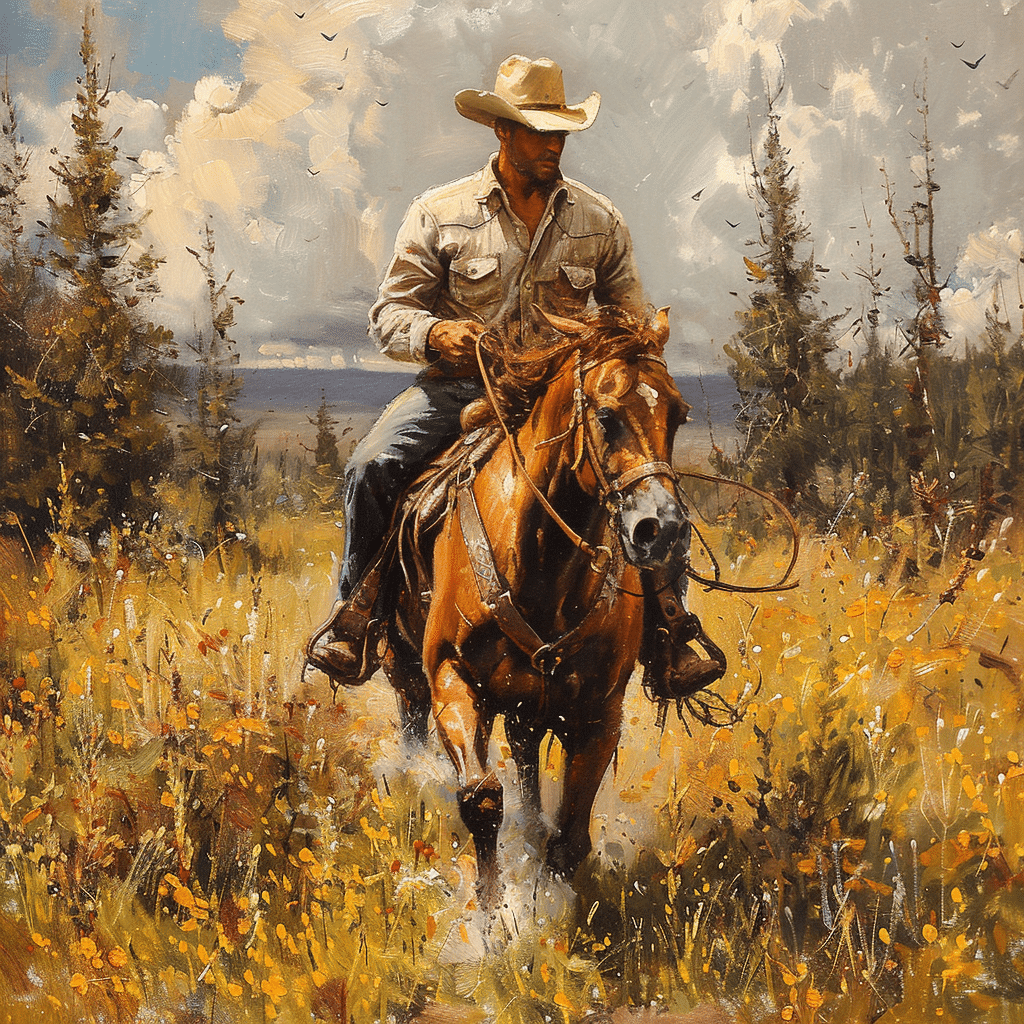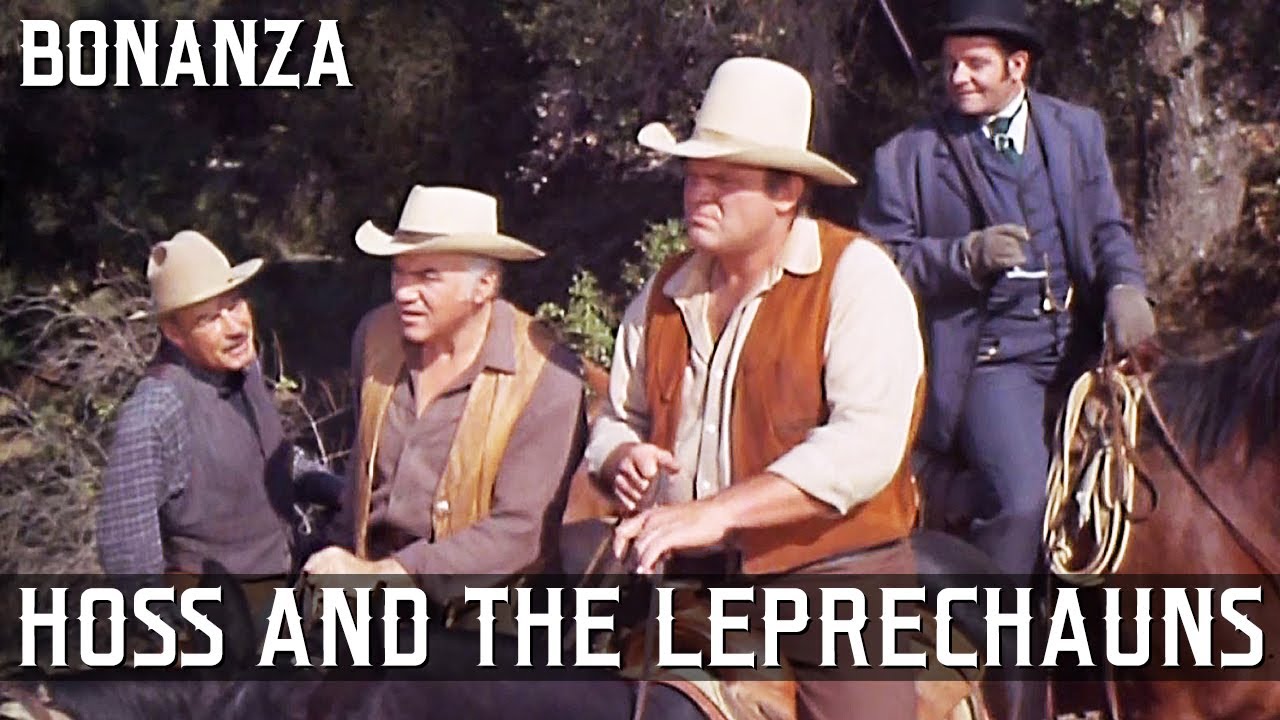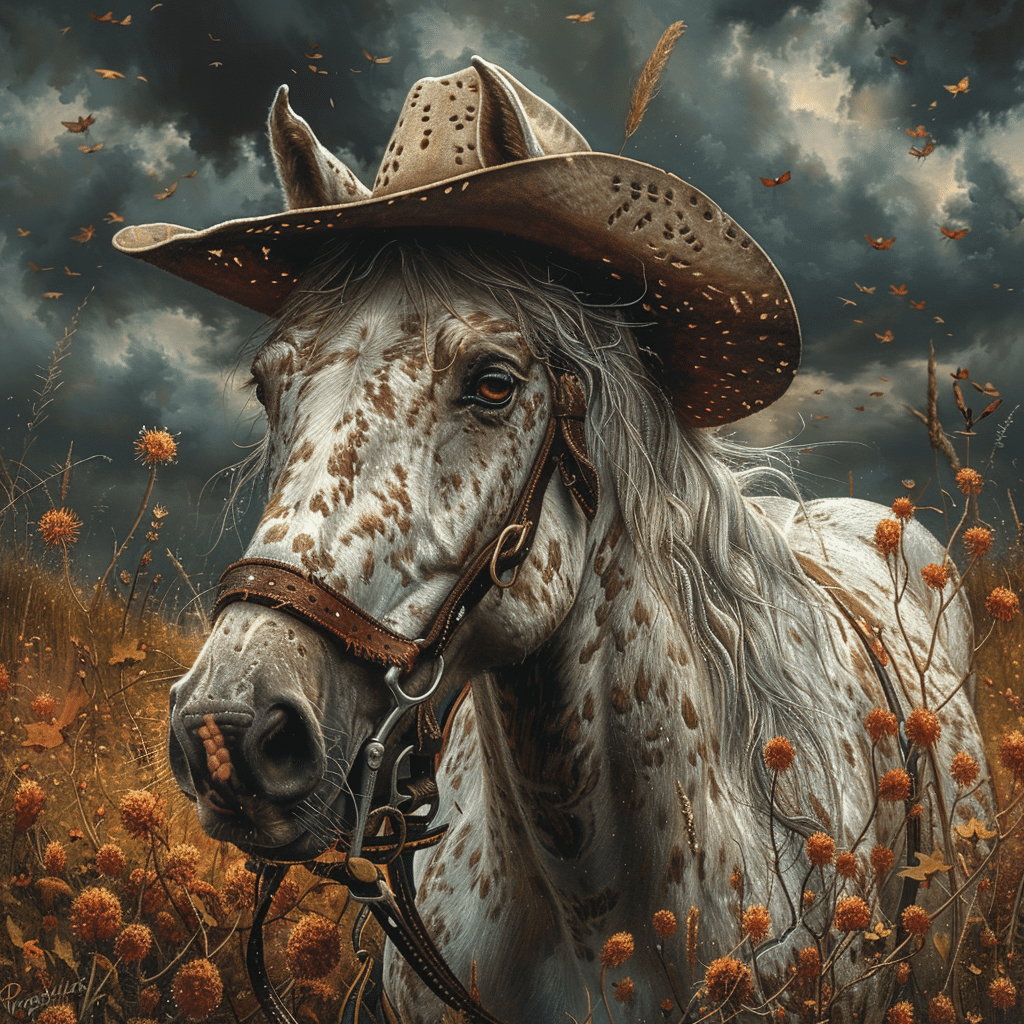When the Southern drawl utters the term ‘hoss’, you can almost smell the sweet scent of magnolias mixed with the earthy grit of red clay. The term ‘hoss’ plants itself firmly in the vernacular garden of Southern strength and resilience like a mighty oak in an open field. It’s a tip of the hat to the enduring spirit that’s been immortalized in film, literature, and the everyday talk that whistles through the pines.

The Rise of ‘Hoss’ in Popular Culture
Originally a dialectal twist on the word ‘horse’, dating back to 1809, ‘hoss’ has evolved into a term for a person embodying strength and dependability, qualities as imposing as the beast of burden itself. As sweet tea is to the Southern palate, so has ‘hoss’ become a fixture in popular culture—a metaphorical melange of respect and admiration for those who bear the weight of life with unshakable fortitude.
In the cinematic sphere, the ‘hoss’ has trotted from the sidelines to center stage. Picture John Wayne—the epitome of grit—in “True Grit” or Tommy Lee Jones in “No Country for Old Men”. These characters, with their no-nonsense resilience, have etched the ‘hoss’ deeply into the soul of film lovers, transcending regional confines and galloping onto the global stage.

Defining the True ‘Hoss’: Characteristics and Inspirations
Ask a Southerner to paint you a picture of a ‘hoss’, and you’ll get a portrait of a man who’s as steady as a German oak—or in this case, a ‘haus’. But a true ‘hoss’ ain’t just a physical powerhouse. They possess a moral compass that points true north, akin to the stalwart figure of Atticus Finch in “To Kill a Mockingbird”, a touchstone of Southern conscience.
Consider modern icons like Dwayne “The Rock” Johnson. Though not born in the Southern states, Johnson’s family roots anchor deep in the soil of strength and valor—a living, breathing testament to the ‘hoss’ in flesh and spirit.

| Attribute | Description |
| Term | Hoss |
| Origin (Southern US Slang) | Adaptation of the word “horse” with a specific dialectal pronunciation. |
| Standard Meaning | A big, strong, and reliable person, typically a man. |
| Connotation | Term of endearment and respect. Used to refer to someone dependable, like a horse. |
| Cultural Context | Commonly used in Southern United States; signifies admiration and trust. |
| Etymology | Derived from “horse” (1809). Likely influenced by the stature and steadiness of a horse. |
| Alternate Origins Claim | Some believe the term may have Swedish origins, meaning “Big, strong, gentle, dependable man”. |
| Usage as Address | Often used to directly address a man, sometimes capitalized to show respect or familiarity. |
| International Comparison | Similar to “Haus” (meaning house in German), showing the term’s potential Germanic roots and emphasizing stability and structure. |
| Pronunciation | /hɒs/ |
| Significance | Indicates a high level of respect for an individual’s physical strength or character. |
| Popular Culture | Often encountered in Western movies, television shows, and Southern literature. |
Portrayals of ‘Hoss’ in Cinema: A Critical Analysis
Brothers and sisters, let’s talk cinema: that great American serenade to our trials and triumphs. Movies have been pivotal in honing the image of the ‘hoss’, reflecting back at us the towering yet tender figures that dot our landscape. From Matthew McConaughey’s turn as the Southern lawyer in “A Time to Kill” to Forrest Whitaker’s depiction of the indefatigable singer in “The Butler”, we witness a lineage of ‘hoss-like’ tenacity.
The depth of character in these portrayals offers a complex fabric of a ‘hoss’—they’re strong, sure, but they pack more than just a mean right hook; they carry hearts bigger than the burdens they bear. These gents grace the silver screen with statures that rival the heads on Mount Rushmore and hearts as wide as the Mississippi.

Musical Odes to ‘Hoss’: Lyrics That Embolden and Inspire
Lord knows, the sound of a steel guitar can get your heart pounding in tune with Southern pride. Southern rock and country ballads often croon about the fabled ‘hoss’. Like the resilient stomp in Lynyrd Skynyrd’s “Simple Man” and the quiet strength resonating in Jason Isbell’s “Cover Me Up”, these songs distill the spirit of the ‘hoss’ into melody and verse.
Curiously, the humble charm of tasman Ugg Slippers rings true when paired with musical tributes to the ‘hoss’. It’s that underlying tone of comforts earned and simplicity cherished that resounds in the chorus of Johnny Cash’s “Man in Black” and shines through in the foot-tapping rhythm of “Ramblin’ Man” by The Allman Brothers Band.

‘Hoss’ in Southern Literature: A Legacy Embroidered in Words
Good gracious, the stories told by the Southern quill have given us ‘hosses’ as complex as a Sunday dinner spread. William Faulkner’s literary creations and Flannery O’Connor’s moral warriors present characters like Quentin Compson, who wield strength of mind alongside brawn. The penmanship of these authors embroiders the ‘hoss’ in an intricate patchwork of morality and muscle.
And let’s not lean on the old guard too heavily; contemporary writers like Jesmyn Ward are stitching fresh tales into the fabric of our understanding of the ‘hoss’. Ensconcing strength in a more cerebral sense, Ward’s narratives exalt the power of endurance and the quiet might of conviction.
Redefining ‘Hoss’ in Modern Southern Life
Well, butter my biscuit, but the ‘hoss’ has galloped forth from the fields of yesteryear into the cyber-frontiers of today. We reckon with folks like environmentalist Will Allen—a titan against the tides of change—and Sarah Blakely, whose sartorial savviness granted her tech visionary status. These individuals now stand as modern pillars of the storied ‘hoss’ legacy.
Their stories, you see, show us just how deeply the ‘hoss’ runs in the Southern spirit, as invigorating as the cheer of a full-blown college football home plate and as richly layered as the house bunny cast nested in Hollywood lore.
The Enduring Impact of ‘Hoss’ on Southern Identity
End all, to speak of the ‘hoss’ is to conjure the very marrow of the South. It ain’t just about being big and strong, bless your heart, but about a steadfast reliability and a respect as deep as the holler. The significance of ‘hoss’ paints the Southern identity in broad strokes of hickory-smoked honor and molasses-slow wisdom.
From the plains to the Hinkley skies overhead, the ‘hoss’ stands tall, a testament to all that’s admired and esteemed in the Southern way of life. With interviews and historical anecdotes stuffed in our overalls, we understand that ‘hoss’ ain’t just a word—it’s a cradle of culture, weaving through the narrative of the South like the mighty rivers that carve its land.
Grab a plate of fig & olive, y’all, and chew on that: the ‘hoss’ is here to stay, guiding the South through the thick brush of the past and into the open pastures of the future. The strength of the Southern ‘hoss’—rooted, unwavering, and true—ever echoes in the canon of America’s story. And to that, we tip our hats and say, “Long may the ‘hoss’ trot.”
The Enduring Legacy of the Hoss
When the word “hoss” comes up in conversation, ya might think of a big, strapping, fella—a fixture in the American South symbolizing strength and reliability. Well, that’s exactly what “hoss” means, and I’ll tell ya, it’s as Southern as fig & olive branches in those swanky uptown restaurants.
Now, speaking of reliability, when someone says they “will do something,” it’s as sturdy as a handshake under the oak trees. The phrase will do meaning represents a commitment, a promise that’s as strong as a hoss itself. A hoss’s word is its bond, making it an unspoken oath, kinda like telling your sweetheart,I love My Gf, without clamoring for a megaphone. Speaking of love, if your girl’s got a hoss’s strength and heart, you might wanna whisper those “i love my gf( words to her every chance you get.
A Symbol in Pop Culture
Hoss is no stranger to pop culture either; its symbol of strength has popped up in everything from classic Westerns to modern memes. And just like coming up with Fathers day Ideas that are out of the ordinary, seeing “hoss” in a movie or a show brings about a sense of nostalgia, mixed with a pinch of excitement. It’s like uncovering an old family photo in the attic and realizing your great-Uncle Earl was the hoss of his time—strong, steadfast, and with a moustache that could command respect at twenty paces.
So strap in, ’cause “hoss” is a term that ain’t going nowhere—it’s here to stay, just like the imprint of a well-worn pair of cowboy boots on a dusty trail. Every time you hear it, tip your hat to the South. For it’s there that the hoss continues to gallop through hills and valleys of American culture, strong and true.

What does Hoss mean slang?
What does Hoss mean slang?
Well, butter my biscuit, if someone calls you a “Hoss,” take it as a hefty compliment! In the South, “Hoss” is a term of endearment for someone who’s as strong and dependable as a workhorse. It’s like saying you’re the big cheese, but with more muscle!
Why do Texans say Hoss?
Why do Texans say Hoss?
Texans sure do love their tall tales and big hats, and when they say “Hoss,” they’re tipping their hat to someone they respect. It’s all about acknowledging someone who’s as reliable as a sturdy stallion—strong, capable, and someone you’d be darn proud to have in your corner. Yee-haw!
What is the origin of Hoss?
What is the origin of Hoss?
Diving into the word “Hoss,” its roots run as deep as an old country well, stemming from an old, twangy twist on the word “horse.” Dating back to 1809, this Southern spin on the term paints a picture of a man who is big, strong, and just plain reliable. Plus, our Swedish friends might nod in agreement, as they claim it means the same in their neck of the woods!
What does the term Haus mean?
What does the term Haus mean?
No beating around the bush here—over in Germany, “Haus” is as straightforward as it gets, meaning “house.” It’s a no-nonsense word from the Germanic family that’s all about where you hang your hat at the end of the day.
Why did they call him Hoss on Bonanza?
Why did they call him Hoss on Bonanza?
On the hit show “Bonanza,” they didn’t just pull names out of a hat when they dubbed the big, friendly middle Cartwright brother “Hoss.” It suited him to a T, capturing his nature as a big-hearted, solid-as-a-rock kind of guy you could lean on—a real-life depiction of the slang!
What is a Hussey slur?
What is a Hussey slur?
Oh, lordy, tread with caution when you hear “Hussey”—it’s an old-fashioned slur that cuts deep. It was once flung at women considered too forward or brash, but let’s leave this word in the dust where it belongs. We’re all about respect these days!
What is another word for Hoss?
What is another word for Hoss?
Stumped for a synonym for “Hoss”? Think of words like “titan,” “behemoth,” or even “bruiser”—anything that paints a picture of a person with more grit than a dirt road and the strength to match.
What does Hoss mean Webster?
What does Hoss mean Webster?
According to our good ol’ friend Webster, “Hoss” isn’t just a fancy way of saying “horse”—it’s the moniker for a fella who’s robust and reliable. Think of the most steadfast person you know, and you’ve got yourself a “Hoss.”
What do Texans call their fathers?
What do Texans call their fathers?
Well, down in Texas, they sure have a slew of names for their fathers, from the classic “Dad” to the endearing “Papa,” “Pops,” and everything in between. It’s all about that personal touch, like a signature on a cowboy’s hat.
Why do people say Hoss?
Why do people say Hoss?
People throw around “Hoss” when they’ve got someone in their lives as reliable as an old truck. It’s a tip of the hat to those with the backbone of a steel girder, and a nod to their strength and character.
What does Hoss mean Reddit?
What does Hoss mean Reddit?
According to the internet sleuths and armchair philosophers on Reddit, “Hoss” is a tip of the cap to those who stand tall and strong. It’s a nod of recognition in a digital sea of anonymity, marking someone as a pillar of strength.
What does Buford mean?
What does Buford mean?
Buford? Now that’s a name that sounds as sturdy as a well-built barn. It has that old, aristocratic ring to it, traced back to English and French roots, meaning “ford near a castle.” So, if your name’s Buford, you’re practically royalty!
Who is a Cuddy?
Who is a Cuddy?
Stroll through Scottish slang and you’ll bump into “Cuddy,” a quirky term originally meaning a donkey. But don’t get it twisted—it’s morphed over time to refer to a pal or a mate in a chummy, banter-filled way.
What does Haus mean in drag?
What does Haus mean in drag?
In the drag world, “Haus” struts down the runway borrowing from its German meaning “house,” but with more glitter. It’s more than a building; it’s a family, a dynasty of drag performers strutting under one fabulous banner!
What does Cuddy mean slang?
What does Cuddy mean slang?
When slang gets cozy, “Cuddy” pops its head in, offering a laid-back version of “buddy” or “friend.” It’s like a verbal fist bump that says, “Hey, we’re cool” without spilling your drink.
What is another word for Hoss?
What is another word for Hoss?
Looking for another way to say “Hoss”? Well, you might as well call them a “colossus” or perhaps even a “giant,” because they’re the ones standing head and shoulders above the rest in terms of strength and reliability.
What does Hoss mean Webster?
What does Hoss mean Webster?
Webster’s got the scoop on “Hoss,” pointing it back to its horsey origins but also noting it’s slang for the kind of person who’s as steadfast as a soldier and as trustworthy as old faithful.
What does Buford stand for?
What does Buford stand for?
Ah, “Buford”—it stands tall and proud, carrying that air of an old Southern name that whispers tales of chivalry. Originating from a place name meaning “ford by the castle,” it’s got that noble ring that makes you think of a man of honor.
What is that urban dictionary?
What is that urban dictionary?
Looking for the down-low on the latest slang? Urban Dictionary is your streetwise cousin who’s got the 411 on everything from A to Z. It’s the online slang bible where new words are born and where “fetch” keeps trying to happen.

























